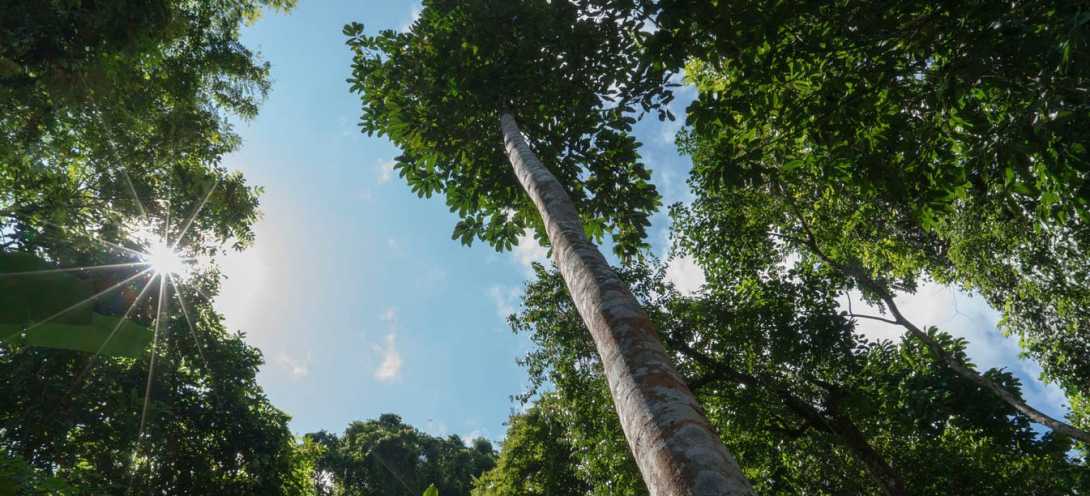
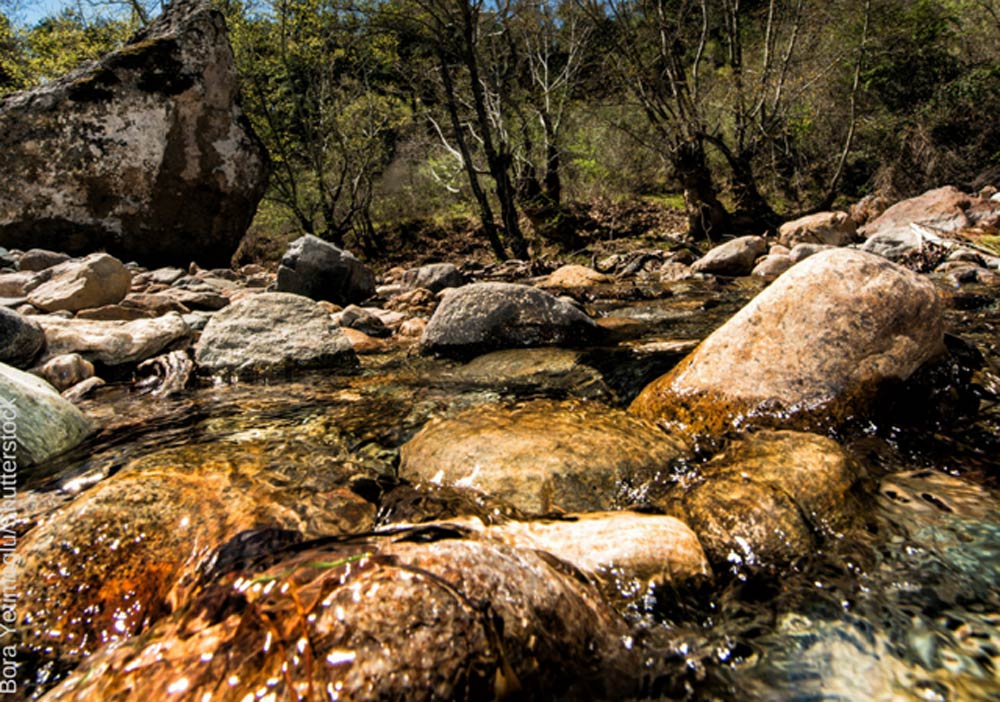








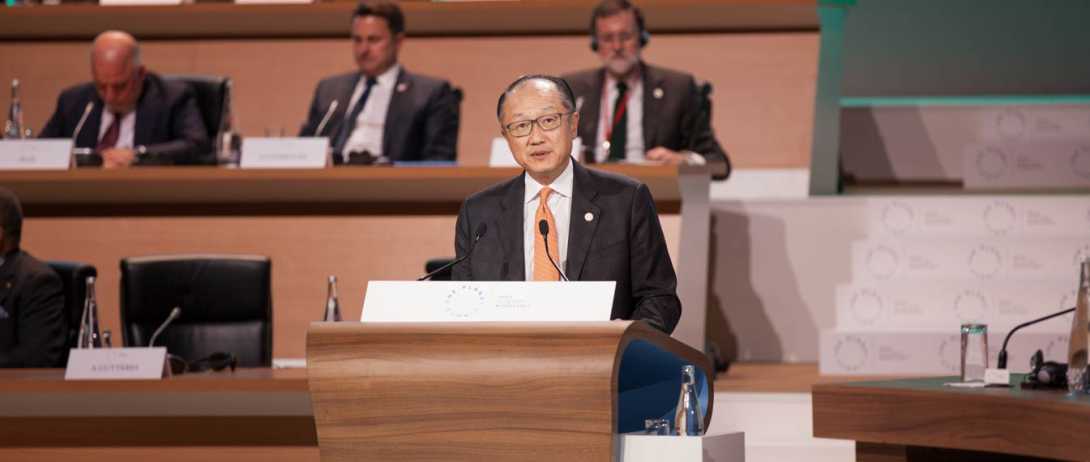

 The first deal is with Energy Efficiency Services Limited, or EESL – a company that finances residential and public sector energy efficiency investments in India. EESL has already deployed more than 275 million LED bulbs, 4.2 million LED tube lights, and 4 million street lights in municipalities throughout India. Through an innovative bulk procurement business model, EESL has driven down prices to make climate-smart LED bulbs as affordable as conventional bulbs, saving energy costs for customers. Early next year, EESL will use a 220 million dollar World Bank (IBRD) loan, combined with an 80 million dollar guarantee facility, and leverage 200 million dollars of commercial finance to deploy thousands of electric cars and charging stations and millions of smart meters throughout India.
The first deal is with Energy Efficiency Services Limited, or EESL – a company that finances residential and public sector energy efficiency investments in India. EESL has already deployed more than 275 million LED bulbs, 4.2 million LED tube lights, and 4 million street lights in municipalities throughout India. Through an innovative bulk procurement business model, EESL has driven down prices to make climate-smart LED bulbs as affordable as conventional bulbs, saving energy costs for customers. Early next year, EESL will use a 220 million dollar World Bank (IBRD) loan, combined with an 80 million dollar guarantee facility, and leverage 200 million dollars of commercial finance to deploy thousands of electric cars and charging stations and millions of smart meters throughout India.
 The second deal is on Indonesia Geothermal – a Resource Risk Mitigation Facility, established by the Government of Indonesia with support from the World Bank and other partners. The Facility will provide concessional funding and grants to pool and reduce the exposure of developers in the early exploration and drilling phases of geothermal projects. With a 150 million dollar investment from the Government of Indonesia and 325 million dollars in concessional financing, Indonesia Geothermal is expected to leverage up to four billion dollars in private sector funding to develop more than one gigawatt of new thermal capacity, which is part of Indonesia’s target to add 5.8 gigawatts of geothermal power generation by 2026.
The second deal is on Indonesia Geothermal – a Resource Risk Mitigation Facility, established by the Government of Indonesia with support from the World Bank and other partners. The Facility will provide concessional funding and grants to pool and reduce the exposure of developers in the early exploration and drilling phases of geothermal projects. With a 150 million dollar investment from the Government of Indonesia and 325 million dollars in concessional financing, Indonesia Geothermal is expected to leverage up to four billion dollars in private sector funding to develop more than one gigawatt of new thermal capacity, which is part of Indonesia’s target to add 5.8 gigawatts of geothermal power generation by 2026.
 The third deal is with the new City Resilience Program – or CRP, where we’re partnering with the Global Covenant of Mayors to bring together the largest global alliance of cities committed to tackling climate change. CRP will design and structure climate resilient investments and catalyze new sources of capital to finance them. Over the next three years, the CRP will leverage 4.5 billion dollars in World Bank loans to catalyze billions in public and private capital for technical assistance, project co-financing, and credit enhancement. Essentially, the program will act as an investment banker for cities to structure programs that address their vulnerabilities to climate change. The first phase is starting with more than 30 cities, with the goal of scaling to more than 500 cities in the next decade.
The third deal is with the new City Resilience Program – or CRP, where we’re partnering with the Global Covenant of Mayors to bring together the largest global alliance of cities committed to tackling climate change. CRP will design and structure climate resilient investments and catalyze new sources of capital to finance them. Over the next three years, the CRP will leverage 4.5 billion dollars in World Bank loans to catalyze billions in public and private capital for technical assistance, project co-financing, and credit enhancement. Essentially, the program will act as an investment banker for cities to structure programs that address their vulnerabilities to climate change. The first phase is starting with more than 30 cities, with the goal of scaling to more than 500 cities in the next decade.
 The fourth deal is the West African Coastal Areas Management Program, or WACA, which targets 17 West African countries with the goal of crowding-in two billion dollars to tackle coastal erosion, flooding, and climate change adaptation. The city of St Louis in Senegal will be one of the first beneficiaries. An initial 215 million dollar package that includes 180 million dollars from our IDA fund for the poorest countries, 20 million dollars from the Global Environment Facility (GEF), and nine million dollars from the Nordic Development Fund (NDF) will be presented to the World Bank Board early next year. Then we expect further public and private investments will be mobilized, including, for example, financing for tourism operations.
The fourth deal is the West African Coastal Areas Management Program, or WACA, which targets 17 West African countries with the goal of crowding-in two billion dollars to tackle coastal erosion, flooding, and climate change adaptation. The city of St Louis in Senegal will be one of the first beneficiaries. An initial 215 million dollar package that includes 180 million dollars from our IDA fund for the poorest countries, 20 million dollars from the Global Environment Facility (GEF), and nine million dollars from the Nordic Development Fund (NDF) will be presented to the World Bank Board early next year. Then we expect further public and private investments will be mobilized, including, for example, financing for tourism operations.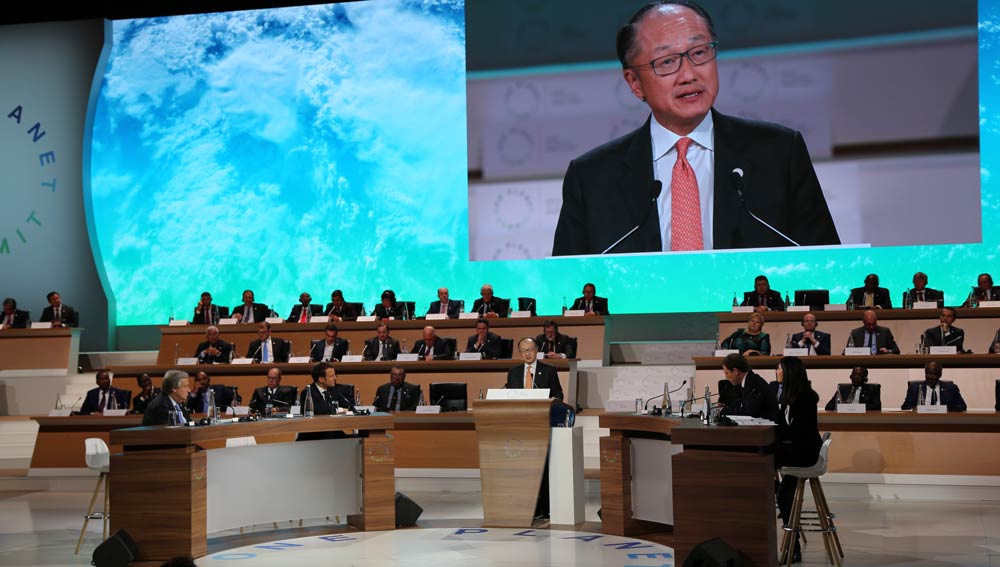

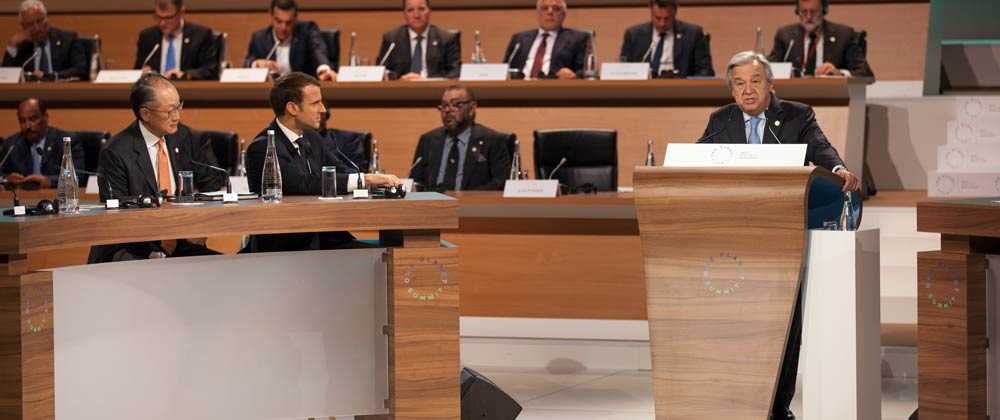
"Climate Financing is at the center of the discussion. #COP23 negotiations have proven that countries need to pledge their investments towards #climateaction". @PEspinosaC, Executive Secretary @UNFCCC #OnePlanet pic.twitter.com/r9kYisBac0
— Connect4Climate (@Connect4Climate) December 12, 2017

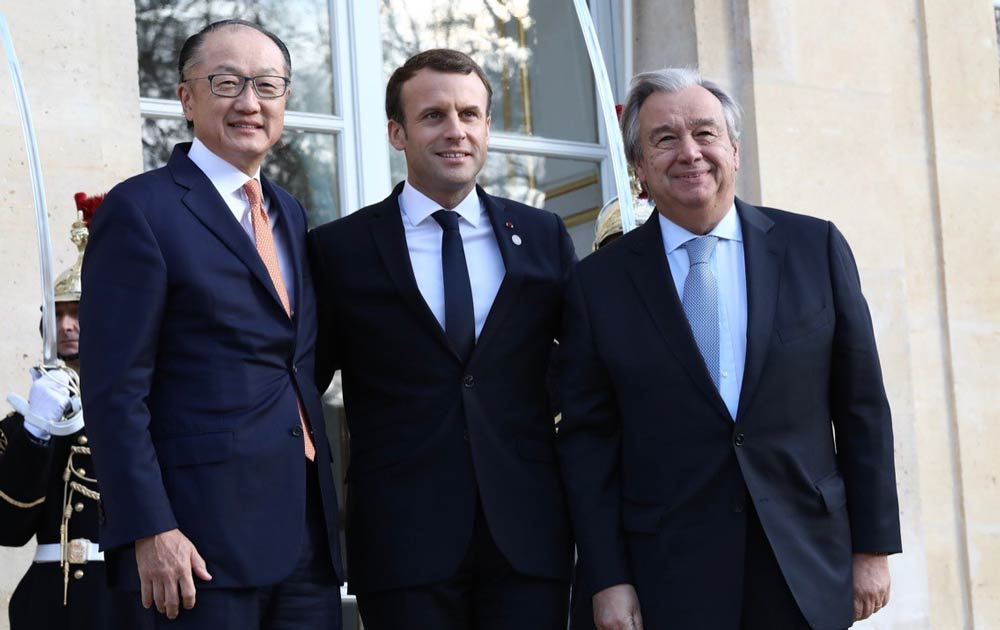
Thank you @antonioguterres, @JimYongKim for co-organizing this unprecedented Summit on climate action.
— Emmanuel Macron (@EmmanuelMacron) December 12, 2017
More than statements, this #OnePlanetSummit is all about mobilizing everyone to lead concrete game-changing actions. #OnePlanet pic.twitter.com/pVuWrZm1P9

 As part of the EU External Investment Plan (EIP), which is set to mobilise at least €44 billion of sustainable investment for Africa and the EU Neighbourhood countries by 2020.
As part of the EU External Investment Plan (EIP), which is set to mobilise at least €44 billion of sustainable investment for Africa and the EU Neighbourhood countries by 2020.
 Climate Action and Energy Commissioner Miguel Arias Cañete announced climate-relevant investments in three targeted areas – sustainable cities, sustainable energy and connectivity and sustainable agriculture, rural entrepreneurs and agribusiness. These targeted areas are expected to generate up to EUR €9 billion investments by 2020.
Climate Action and Energy Commissioner Miguel Arias Cañete announced climate-relevant investments in three targeted areas – sustainable cities, sustainable energy and connectivity and sustainable agriculture, rural entrepreneurs and agribusiness. These targeted areas are expected to generate up to EUR €9 billion investments by 2020.
 UN Environment and BNP Paribas will collaborate to identify suitable commercial projects with measurable environmental and social impact. The aim is to support smallholder projects related to renewable energy access, agroforestry, water access and responsible agriculture, among other sustainable activities.
UN Environment and BNP Paribas will collaborate to identify suitable commercial projects with measurable environmental and social impact. The aim is to support smallholder projects related to renewable energy access, agroforestry, water access and responsible agriculture, among other sustainable activities.
 The Sustainable Finance Facilities programme is the first of its kind in terms of collaboration between companies, investors, development sector partners, and civil society organisations, with the support of national governments.
The Sustainable Finance Facilities programme is the first of its kind in terms of collaboration between companies, investors, development sector partners, and civil society organisations, with the support of national governments.
 This agreement builds on the Tropical Landscapes Financing Facility, a partnership between UN Environment, BNP Paribas, World Agroforestry Centre and ADM Capital in Indonesia.
This agreement builds on the Tropical Landscapes Financing Facility, a partnership between UN Environment, BNP Paribas, World Agroforestry Centre and ADM Capital in Indonesia..@UNEP & @BNPParibas announce at #OnePlanet Summit in Paris to mobilize USD 10 billion for #sustainable projects by 2025 >> https://t.co/dsqWMiUIh8
— Connect4Climate (@Connect4Climate) December 12, 2017
#GlobalGoals #ParisAgreement #ClimateAction #OnePlanetSummit pic.twitter.com/oWk6GC1I1H

 Global investors launched a new initiative to drive action on climate change from the world’s largest corporate greenhouse gas emitters by ensuring they act swiftly to improve governance on climate change, curb emissions, and strengthen climate-related financial disclosures.
Global investors launched a new initiative to drive action on climate change from the world’s largest corporate greenhouse gas emitters by ensuring they act swiftly to improve governance on climate change, curb emissions, and strengthen climate-related financial disclosures.
 Specifically, as part of their collaborative engagement, investors from around the world will ask companies to: Implement a strong governance framework which clearly articulates the board’s accountability and oversight of climate change risk; take action to reduce greenhouse gas emissions across their value chain; provide enhanced corporate disclosure in line with the final recommendations of the Task Force on Climate-related Financial Disclosures (TCFD).
Specifically, as part of their collaborative engagement, investors from around the world will ask companies to: Implement a strong governance framework which clearly articulates the board’s accountability and oversight of climate change risk; take action to reduce greenhouse gas emissions across their value chain; provide enhanced corporate disclosure in line with the final recommendations of the Task Force on Climate-related Financial Disclosures (TCFD).
 Alongside the ongoing emergency response, Caribbean leaders announced the launch of a new public-private coalition to create the world's first "climate-smart zone" that will transform the regional energy system, build resiliency, drive economic growth and set a global example.
Alongside the ongoing emergency response, Caribbean leaders announced the launch of a new public-private coalition to create the world's first "climate-smart zone" that will transform the regional energy system, build resiliency, drive economic growth and set a global example.
 The Caribbean Climate-Smart Coalition will support and help catalyse an ambitious USD 8 billion investment plan to bring greater energy and infrastructure resilience to 3.2 million Caribbean households. It will help Caribbean islands to eliminate their costly dependency on fossil fuels so that they can meet close to 100% percent of their energy needs from clean or renewable sources, and to embed resilience into communities and livelihoods to realise the bold ambitions of all Caribbean people.
The Caribbean Climate-Smart Coalition will support and help catalyse an ambitious USD 8 billion investment plan to bring greater energy and infrastructure resilience to 3.2 million Caribbean households. It will help Caribbean islands to eliminate their costly dependency on fossil fuels so that they can meet close to 100% percent of their energy needs from clean or renewable sources, and to embed resilience into communities and livelihoods to realise the bold ambitions of all Caribbean people.
 The climate smart agriculture programme will leverage information and communication technologies (ICTs) to provide access to agriculture assets. Using a digital platform, known as ‘Buy-From-Farmers’ or AgriFed, small-scale women and youth farmers will be connected to customers, suppliers, information, markets and finance to help build their economic identity and make them valued entrepreneurs, able to end food insecurity in the Sahel.
The climate smart agriculture programme will leverage information and communication technologies (ICTs) to provide access to agriculture assets. Using a digital platform, known as ‘Buy-From-Farmers’ or AgriFed, small-scale women and youth farmers will be connected to customers, suppliers, information, markets and finance to help build their economic identity and make them valued entrepreneurs, able to end food insecurity in the Sahel.
 UN Women presented the programme, which is among some 12 initiatives showcased at today’s Summit, on behalf of the UN system.
UN Women presented the programme, which is among some 12 initiatives showcased at today’s Summit, on behalf of the UN system.
 UNITLIFE will use digital innovation to collect voluntary micro-donations from consumers at the time of a purchase. During the initiative’s implementation phase, the micro-donations will go into a central fund, hosted by the United Nations Office for Project Services (UNOPS).
UNITLIFE will use digital innovation to collect voluntary micro-donations from consumers at the time of a purchase. During the initiative’s implementation phase, the micro-donations will go into a central fund, hosted by the United Nations Office for Project Services (UNOPS).
 The funds will then be disbursed to support a set of important and complementary measures, currently overlooked and underfunded, in order to address both climate change and malnutrition (affecting approximately one in five children worldwide and constituting a major hindrance for the development of the poorest countries).
The funds will then be disbursed to support a set of important and complementary measures, currently overlooked and underfunded, in order to address both climate change and malnutrition (affecting approximately one in five children worldwide and constituting a major hindrance for the development of the poorest countries).
 An early program, supported by UN Women, will encourage training for women on climate-resilient agriculture in the Sahel region.
An early program, supported by UN Women, will encourage training for women on climate-resilient agriculture in the Sahel region.
 Mike Bloomberg and FSB Chair Mark Carney announced growing support for the TCFD on the two-year anniversary of the Paris Agreement, including over 150 financial firms, responsible for assets of over USD 81.7 trillion.
Mike Bloomberg and FSB Chair Mark Carney announced growing support for the TCFD on the two-year anniversary of the Paris Agreement, including over 150 financial firms, responsible for assets of over USD 81.7 trillion.
 The companies and organizations supporting the TCFD, which have more than doubled in number in the five months since the recommendations were published in June 2017, span the entire capital and investment chain—from companies that issue equity and debt to the largest credit rating agencies to stock exchanges and ultimately to investors that buy the equities and debt.
The companies and organizations supporting the TCFD, which have more than doubled in number in the five months since the recommendations were published in June 2017, span the entire capital and investment chain—from companies that issue equity and debt to the largest credit rating agencies to stock exchanges and ultimately to investors that buy the equities and debt.
 Under the new partnership, the EBRD and the GCoM are seeking to drive climate action in up to 60 cities, including many that have not been a focus for climate support so far.
Under the new partnership, the EBRD and the GCoM are seeking to drive climate action in up to 60 cities, including many that have not been a focus for climate support so far.
 The EBRD will provide over US$ 500 million in “first mover” financing aimed at leveraging additional third party contributions for the development and implementation of city action plans and projects worth a total of US$ 1.5 billion.
The EBRD will provide over US$ 500 million in “first mover” financing aimed at leveraging additional third party contributions for the development and implementation of city action plans and projects worth a total of US$ 1.5 billion.
 Canada and the World Bank Group will support the acceleration of developing countries’ transition away from traditional coal-fired electricity toward clean energy to power their fast-growing economies.
Canada and the World Bank Group will support the acceleration of developing countries’ transition away from traditional coal-fired electricity toward clean energy to power their fast-growing economies.
 They will also support small island developing states in expanding their renewable energy infrastructure, helping to put them on a more sustainable pathway that is less polluting and ensures greater energy access. This work also includes sharing best practices on how to ensure a just transition for displaced workers and their communities to minimize hardships and help workers and communities benefit from new clean growth opportunities.
They will also support small island developing states in expanding their renewable energy infrastructure, helping to put them on a more sustainable pathway that is less polluting and ensures greater energy access. This work also includes sharing best practices on how to ensure a just transition for displaced workers and their communities to minimize hardships and help workers and communities benefit from new clean growth opportunities.
 In 2015, AXA committed to reach Euro 3 billion in green investments by 2020. Given that this target has already been reached, the Group has decided to quadruple its original target and reach Euro 12 billion by 2020.
In 2015, AXA committed to reach Euro 3 billion in green investments by 2020. Given that this target has already been reached, the Group has decided to quadruple its original target and reach Euro 12 billion by 2020.
 AXA decided two years ago to divest Euro 500 million from the coal industry by targeting companies which derive over 50% of their revenues from coal. Today, the group decided to increase its divestment fivefold to reach Euro 2.4 billion, by divesting from companies which derive more than 30% of their revenues from coal, have a coal-based energy mix that exceeds 30%, actively build new coal plants, or produce more than 20 million tonnes of coal per year.
AXA decided two years ago to divest Euro 500 million from the coal industry by targeting companies which derive over 50% of their revenues from coal. Today, the group decided to increase its divestment fivefold to reach Euro 2.4 billion, by divesting from companies which derive more than 30% of their revenues from coal, have a coal-based energy mix that exceeds 30%, actively build new coal plants, or produce more than 20 million tonnes of coal per year.
 The bond fund adds to USD 2.1 billion equity funds run by Storebrand which also have no investments in fossil fuels. In total, Storebrand has a total USD 80 billion worth of assets under management.
The bond fund adds to USD 2.1 billion equity funds run by Storebrand which also have no investments in fossil fuels. In total, Storebrand has a total USD 80 billion worth of assets under management.
 The new fund, Storebrand Global Kreditt IG, will be invested mainly in corporate bonds issued by financial institutions and industrial companies in developed nations.
The new fund, Storebrand Global Kreditt IG, will be invested mainly in corporate bonds issued by financial institutions and industrial companies in developed nations.
 World Bank says it will cease financing upstream oil and gas after 2019, apart from certain gas projects in the poorest countries in exceptional circumstances, where there is a clear benefit in terms of energy access for the poor and the project fits within the countries’ Paris Climate Change Agreement commitments).
World Bank says it will cease financing upstream oil and gas after 2019, apart from certain gas projects in the poorest countries in exceptional circumstances, where there is a clear benefit in terms of energy access for the poor and the project fits within the countries’ Paris Climate Change Agreement commitments).
 The bank also announced it was "on track to meet its target of 28 percent of its lending going to climate action by 2020."
The bank also announced it was "on track to meet its target of 28 percent of its lending going to climate action by 2020."#BreakingNews: @WorldBank will no longer finance upstream #oil and #gas after 2019 → https://t.co/bmnnUwueqp #OnePlanet pic.twitter.com/xIC41kt4UT
— Connect4Climate (@Connect4Climate) December 12, 2017

 Nine of Europe’s largest industrial emitters of green bonds (EDF, Enel, ENGIE, Iberdrola, Icade, Paprec, SNCF Réseau, SSE and TenneT) publicly announced their pledge to further develop one of the most dynamic segments of sustainable finance today, the green bond market.
Nine of Europe’s largest industrial emitters of green bonds (EDF, Enel, ENGIE, Iberdrola, Icade, Paprec, SNCF Réseau, SSE and TenneT) publicly announced their pledge to further develop one of the most dynamic segments of sustainable finance today, the green bond market.
 These companies have joined forces to voice their commitment to the green bond market as part of their strategy, financing policy and their active engagement in the reporting debate and dialogue with investors. The pledge also calls upon other industrial corporates to consider issuing green bonds.
These companies have joined forces to voice their commitment to the green bond market as part of their strategy, financing policy and their active engagement in the reporting debate and dialogue with investors. The pledge also calls upon other industrial corporates to consider issuing green bonds.
 Top green finance official Ma Jun told Climate Finance Day attendees that China wants international support to clean up its investments abroad. Ma Jun explained that without this information, the market cannot determine who is green – or not.
Top green finance official Ma Jun told Climate Finance Day attendees that China wants international support to clean up its investments abroad. Ma Jun explained that without this information, the market cannot determine who is green – or not.
 China is also encouraging green investment at home. These range from cheap money for banks that invest in green projects to requiring certain industries to take out pollution liability insurance.
China is also encouraging green investment at home. These range from cheap money for banks that invest in green projects to requiring certain industries to take out pollution liability insurance.
 He said that 2020, all companies would be required to disclose information on their environmental impact: “The basic logic is: we need a lot of money for green investments”.
He said that 2020, all companies would be required to disclose information on their environmental impact: “The basic logic is: we need a lot of money for green investments”.
 ExxonMobil says it will publish new details about how climate change could affect its business, in a move aimed at appeasing critics and forestalling another proxy fight next year.
ExxonMobil says it will publish new details about how climate change could affect its business, in a move aimed at appeasing critics and forestalling another proxy fight next year.
 The largest U.S. oil and gas producer said in a filing to U.S. securities regulators that its board agreed to provide shareholders with information on “energy demand sensitivities, implications of two degree Celsius scenarios, and positioning for a lower-carbon future.”
The largest U.S. oil and gas producer said in a filing to U.S. securities regulators that its board agreed to provide shareholders with information on “energy demand sensitivities, implications of two degree Celsius scenarios, and positioning for a lower-carbon future.”
 Through the One Planet Charter, cities will commit to specific climate action that drives investments, sustainable public procurement, and policy decisions in renewable energy, energy efficiency, electric vehicles, and efforts for zero emission buildings and zero waste.
Through the One Planet Charter, cities will commit to specific climate action that drives investments, sustainable public procurement, and policy decisions in renewable energy, energy efficiency, electric vehicles, and efforts for zero emission buildings and zero waste.
 The Charter highlights cities’ commitment to increase demand for sustainable and resilient infrastructure, products and services, while also recognizing the importance of working closely with national governments and business sectors to mobilise global climate action.
The Charter highlights cities’ commitment to increase demand for sustainable and resilient infrastructure, products and services, while also recognizing the importance of working closely with national governments and business sectors to mobilise global climate action. 
 Cities will bring detailed commitments to the 2018 Global Action Summit in California.
Cities will bring detailed commitments to the 2018 Global Action Summit in California.
 Urban 20 (U20) is a new diplomatic initiative, facilitated by C40 Cities, to help cities develop collective messages and inclusive solutions for global issues such as climate action, the future of work and social integration.
Urban 20 (U20) is a new diplomatic initiative, facilitated by C40 Cities, to help cities develop collective messages and inclusive solutions for global issues such as climate action, the future of work and social integration.
 The initiative will bring together 30 major cities located in G20 countries, and many other global cities, to raise the profile of urban issues in the G20 agenda and enhance the role of cities in the G20 process.
The initiative will bring together 30 major cities located in G20 countries, and many other global cities, to raise the profile of urban issues in the G20 agenda and enhance the role of cities in the G20 process.
 The inaugural U20 Mayors Summit will meet in Buenos Aires in October 2018, ahead of the G20 Heads of State Summit hosted by Argentina.
The inaugural U20 Mayors Summit will meet in Buenos Aires in October 2018, ahead of the G20 Heads of State Summit hosted by Argentina.
 New research by C40 Cities and announced by Mayor of Paris, Anne Hidalgo & Former Governor of California Arnold Schwarzenegger revealed the scale of the potential health benefits that could be achieved by cities and regions implementing climate action and policies to clean the air that citizens breathe.
New research by C40 Cities and announced by Mayor of Paris, Anne Hidalgo & Former Governor of California Arnold Schwarzenegger revealed the scale of the potential health benefits that could be achieved by cities and regions implementing climate action and policies to clean the air that citizens breathe.
 Walking or cycling to work, on green & healthy streets, can cut your risk of heart disease by almost one quarter and type 2 diabetes by 15%, and it reduces greenhouse gas emissions.
Walking or cycling to work, on green & healthy streets, can cut your risk of heart disease by almost one quarter and type 2 diabetes by 15%, and it reduces greenhouse gas emissions.
 Since becoming an implementing agency of the Multilateral Fund for the Implementation of the Montreal Protocol in 1992, UNIDO has completed around 1,400 projects to phase-out ozone-depleting substances in developing countries and economies in transition.
Since becoming an implementing agency of the Multilateral Fund for the Implementation of the Montreal Protocol in 1992, UNIDO has completed around 1,400 projects to phase-out ozone-depleting substances in developing countries and economies in transition.
 As a recipient of 20% of the budget of the Multilateral Fund, UNIDO has received USD $849 million to prepare and appraise investment project proposals and implement phase-out schedules at plant level.
As a recipient of 20% of the budget of the Multilateral Fund, UNIDO has received USD $849 million to prepare and appraise investment project proposals and implement phase-out schedules at plant level.


 1. WBG and upstream oil and gas
1. WBG and upstream oil and gas #BreakingNews: @WorldBank will no longer finance upstream #oil and #gas after 2019 → https://t.co/jgbOEBBJse #OnePlanet pic.twitter.com/BYaYLgV4sD
— World Bank (@WorldBank) December 12, 2017

 2. Ramping up WBG climate ambition through its Climate Change Action Plan
2. Ramping up WBG climate ambition through its Climate Change Action Plan
 3. Transparency and disclosure to drive our own decarbonization
3. Transparency and disclosure to drive our own decarbonization
 i) Starting next year, the World Bank Group will report greenhouse gas emissions from the investment projects it finances in key emissions-producing sectors, such as energy. The results will be published in late 2018, and annually thereafter.
i) Starting next year, the World Bank Group will report greenhouse gas emissions from the investment projects it finances in key emissions-producing sectors, such as energy. The results will be published in late 2018, and annually thereafter.
 ii) The World Bank will be applying a shadow price on carbon in the economic analysis of all IBRD/IDA projects in key high-emitting sectors where design has begun since July 2017. IFC started using carbon pricing in key sectors in January 2017 and will mainstream the same starting January 2018.
ii) The World Bank will be applying a shadow price on carbon in the economic analysis of all IBRD/IDA projects in key high-emitting sectors where design has begun since July 2017. IFC started using carbon pricing in key sectors in January 2017 and will mainstream the same starting January 2018.
 4. Mobilizing Finance for transformation in mitigation and climate resilience
4. Mobilizing Finance for transformation in mitigation and climate resilience
 i) IFC will invest up to $325 million in the Green Cornerstone Bond Fund, a partnership with Amundi, to create the largest ever green-bond fund dedicated to emerging markets. This is a $2 billion initiative aiming to deepen local capital markets, and expand and unlock private funding for climate-related projects. The fund is already subscribed at over $1 billion.
i) IFC will invest up to $325 million in the Green Cornerstone Bond Fund, a partnership with Amundi, to create the largest ever green-bond fund dedicated to emerging markets. This is a $2 billion initiative aiming to deepen local capital markets, and expand and unlock private funding for climate-related projects. The fund is already subscribed at over $1 billion.
 ii) Last week, the World Bank and the Government of Egypt signed a $1.15 billion development policy loan aimed at reducing fossil fuel subsidies and creating the environment for low-carbon energy development.
ii) Last week, the World Bank and the Government of Egypt signed a $1.15 billion development policy loan aimed at reducing fossil fuel subsidies and creating the environment for low-carbon energy development.
 iii) The World Bank Group will continue to support investments highlighted at the One Planet Summit which demonstrate opportunities to crowd in different kinds of finance in transformational areas. This includes accelerating energy efficiency in India; scaling up solar energy in Ethiopia, Pakistan and Senegal among other countries; establishing a West Africa Coastal Areas investment platform to build resilience for coastlines of West African countries (partnering with WAEMU, NDF, GEF, GFDRR, AFD, AfDB); and introducing the City Resilience Platform (partnering with the Global Covenant of Mayors) so that up to 500 cities will have access to finance for resilience to climate change.
iii) The World Bank Group will continue to support investments highlighted at the One Planet Summit which demonstrate opportunities to crowd in different kinds of finance in transformational areas. This includes accelerating energy efficiency in India; scaling up solar energy in Ethiopia, Pakistan and Senegal among other countries; establishing a West Africa Coastal Areas investment platform to build resilience for coastlines of West African countries (partnering with WAEMU, NDF, GEF, GFDRR, AFD, AfDB); and introducing the City Resilience Platform (partnering with the Global Covenant of Mayors) so that up to 500 cities will have access to finance for resilience to climate change.
 iv) The World Bank Group will continue to work with the United Nations and other partners on the implementation of the Invest4Climate platform, which will systematically crowd in multiple sources of finance, with a major event showcasing investment opportunities planned for May 2018 at the Innovate4Climate conference in Frankfurt.
iv) The World Bank Group will continue to work with the United Nations and other partners on the implementation of the Invest4Climate platform, which will systematically crowd in multiple sources of finance, with a major event showcasing investment opportunities planned for May 2018 at the Innovate4Climate conference in Frankfurt.
 v) IFC will work to set a single unifying global standard on green bonds, similar to the Equator Principles, as a means to facilitate the development of the green bond market to crowd in private finance into climate business. And to stimulate the greening of the financial sector, the World Bank Group will partner with the Sustainable Banking Network (SBN) to provide technical support to develop and implement national Roadmaps for Sustainable Finance in six countries. These roadmaps are based on a framework developed jointly with UN Environment.
v) IFC will work to set a single unifying global standard on green bonds, similar to the Equator Principles, as a means to facilitate the development of the green bond market to crowd in private finance into climate business. And to stimulate the greening of the financial sector, the World Bank Group will partner with the Sustainable Banking Network (SBN) to provide technical support to develop and implement national Roadmaps for Sustainable Finance in six countries. These roadmaps are based on a framework developed jointly with UN Environment.
 vi) AXA Managed Co-Lending Portfolio Program (MCPP) will allocate a substantial portion of projects to climate-smart infrastructure investments. IFC and Finland launched the Finland-IFC Climate Change Program, a €114 million returnable capital contribution to spur private sector financing for climate-change solutions, targeting low-income countries focused on investments in renewable energy, energy efficiency, green buildings, climate-smart agriculture, and forestry.
vi) AXA Managed Co-Lending Portfolio Program (MCPP) will allocate a substantial portion of projects to climate-smart infrastructure investments. IFC and Finland launched the Finland-IFC Climate Change Program, a €114 million returnable capital contribution to spur private sector financing for climate-change solutions, targeting low-income countries focused on investments in renewable energy, energy efficiency, green buildings, climate-smart agriculture, and forestry. 
 5. Working in partnership
5. Working in partnership 
 i) For the first time, all the Multilateral Development Banks and all International Development Finance Club Members issued a joint statement aligning their finance with the Paris Agreement and identifying areas where they will work together to advance climate-smart development.
i) For the first time, all the Multilateral Development Banks and all International Development Finance Club Members issued a joint statement aligning their finance with the Paris Agreement and identifying areas where they will work together to advance climate-smart development.
 ii) Canada and the World Bank will work together to accelerate the energy transition in developing countries and, together with the International Trade Union Congress, will provide analysis to support efforts towards a just transition away from coal.
ii) Canada and the World Bank will work together to accelerate the energy transition in developing countries and, together with the International Trade Union Congress, will provide analysis to support efforts towards a just transition away from coal.
 iii) Working with France’s AFD and the Kingdom of Morocco, the World Bank will work to accelerate adaptation in agriculture for Africa.
iii) Working with France’s AFD and the Kingdom of Morocco, the World Bank will work to accelerate adaptation in agriculture for Africa.
 iv) The World Bank will support a unique partnership between Caribbean leaders and people, multilateral organizations, and local and international private sector to define a vision for the world’s first climate-smart zone. The key priority areas for action include renewable energy, resilient infrastructure, innovative financing, and capacity building.
iv) The World Bank will support a unique partnership between Caribbean leaders and people, multilateral organizations, and local and international private sector to define a vision for the world’s first climate-smart zone. The key priority areas for action include renewable energy, resilient infrastructure, innovative financing, and capacity building.
 v) The World Bank Group will support, through the Carbon Pricing Leadership Coalition, the proposed Carbon Markets of the Americas initiative.
v) The World Bank Group will support, through the Carbon Pricing Leadership Coalition, the proposed Carbon Markets of the Americas initiative.
 vi) The Principles on Blended Concessional Finance, first published in 2013, have been recently enhanced with more detailed guidelines developed by a working group (chaired by IFC) representing Development Finance Initiatives (DFIs) that annually invest more than $35 billion a year in private sector solutions. These principles include promoting commercially sustainable solutions so that the use of scarce public concessional finance is minimized; and state the need for high social, environmental, and governance standards.
vi) The Principles on Blended Concessional Finance, first published in 2013, have been recently enhanced with more detailed guidelines developed by a working group (chaired by IFC) representing Development Finance Initiatives (DFIs) that annually invest more than $35 billion a year in private sector solutions. These principles include promoting commercially sustainable solutions so that the use of scarce public concessional finance is minimized; and state the need for high social, environmental, and governance standards.
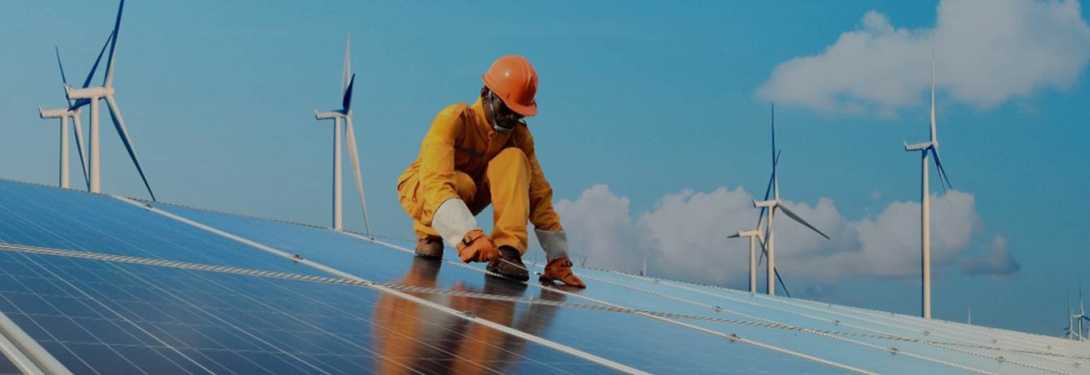

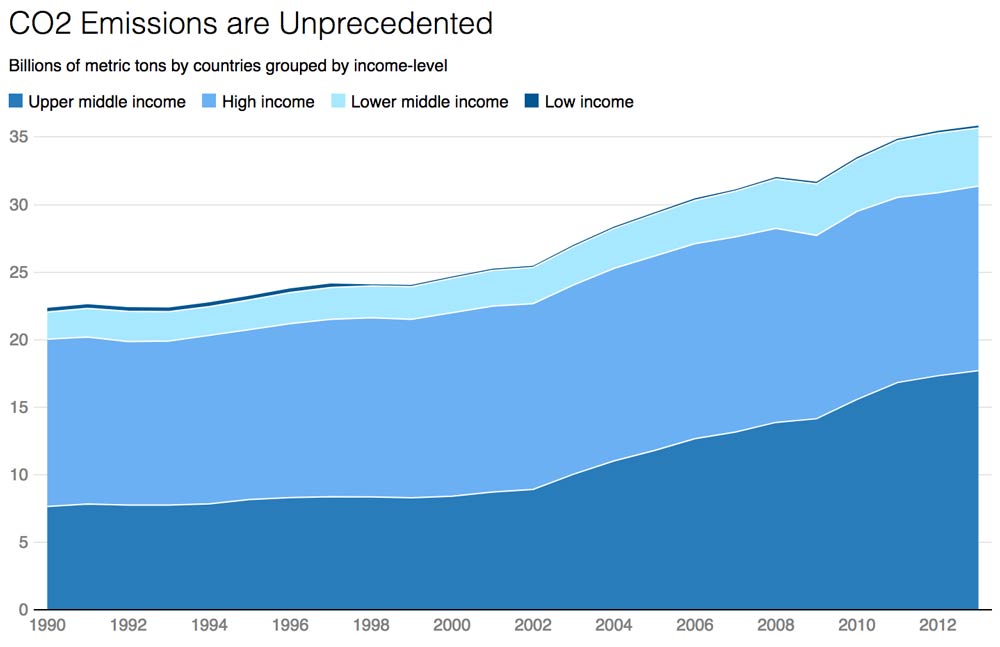

Since the Paris Agreement in 2015, the World Bank Group has been ramping up climate action and stepping up efforts to mobilize finance for climate action to help countries transition to a low-carbon, more resilient world.




Hosted by the World Bank Group and supported by Italy’s Ministry of the Environment and Energy Security and Germany’s Federal Ministry for Economic Cooperation and Development, Connect4Climate (C4C) is a global partnership for a livable planet that connects, creates, and communicates to build long-lasting change for future generations.